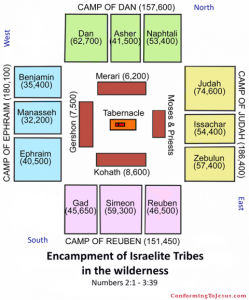In last week’s Parashah ( for 5/20/17, which was a double) we finished the book of Leviticus. That book was mostly legislative in nature, and now we start the book of Numbers, which is more historical. Throughout this book we will learn of the events that occurred while the Children of Israel spent 38 years wandering in the desert.
Numbers takes up where Exodus left off, which is the first day of the second month of the second year after leaving Egypt, when the Tabernacle of the Lord has been completed and is now in service. This parashah starts with a census God orders Moses to take, which identifies the numbers from each tribe of those over 20 and fit for military service. We see this type of census taken, with God’s approval (unlike the one David took in 1 Chronicles, 21) whenever the people needed to be prepared for war. The census did not include the Levites, who were counted separately, as their duties were not for war but service to God by being in charge of the Tabernacle. God also tells Moses which of the Levitical clans will be responsible for which parts of the Tabernacle, as well as the formation of the camp.
Here is a picture of how the encampment was configured:

This parashah doesn’t appear to have any really deep and spiritual messages, does it? I mean, all we are told is how many of each tribe there are, where they camp and how they are to march. We are also told which clan of Levi is responsible for which parts of the Tabernacle when on the march. There just doesn’t seem to be a whole lot of “meat” to this parashah.
Then, again, let’s look a little deeper and cheat a bit, by knowing what is to happen later.
Did you notice that the Kohathites were encamped next to, and marched alongside of, the Reubenites? Do you remember how Reuben had not received the rights of the Firstborn due to his sleeping with one of Israel’s concubines (Genesis 39:3-4), and that Korah also felt slighted because the Kohathites were not to perform the duties of the High Priest. So although we don’t see anything of particular importance in this parashah, by looking back to it later on we can see that the seeds of collusion and rebellion were planted when the tribes of Kohath and Reuben were made neighbors. Perhaps if they had been at opposite ends of the camp, they would not have come together in rebellion?
Certainly God would have known that this placement, which He decreed, would have resulted in the collusion between these men. And, that being a given, we would have to ask, “Why would God have done that?”
Good question. I think I have an answer, which is the same answer God gave to Job: we won’t always understand God’s plans or why He does what He does.
In the case of Job, God allowed all that suffering to show Satan that Job’s faith is greater than Satan’s attacks. Now, from Job’s viewpoint (as well as his friends) there could be no reason why these terrible things were happening, but in the end we learn that the real issue was between God and Satan, not between God and Job. God used Job to show Satan that strong faith in God is more powerful than anything Satan could do.
Perhaps the positioning of Korah and Dathan so close to each other was to test their faith, and if they failed that test (which they did), then to allow Moses and Aaron to be glorified and honored in the sight of all Israel, which is what happened. God used the evil these men intended against His servants to glorify Himself and show Moses and Aaron to be His chosen leaders (Numbers 17:5):
The staff belonging to the man I choose will sprout, and I will rid myself of this constant grumbling against you by the Israelites.”
The bible is one complete book, and even though we might not see what message there is for us in one part of it, when we look at it in its entirety, study it well enough to know what will happen and what has happened, then we can see that there is something for us to learn in every part of the book. Such as in this parashah, which on the surface seems to be a collection of names and numbers, but when looked at knowing the events that will later occur, we can see how God is setting the stage now to glorify Himself later.
This understanding of how God works should fortify our faith in God, and give us comfort during times of trials. Just because we may not see, here and now, what God has planned we can always know that He does have something planned. It just may not be time for whatever he has planned to happen, that’s all.
Take comfort in knowing that everything God does, He does with a plan to glorify His name and to establish His rule. When we accept that and work within it, we will be blessed and supported by God, just as Moses and Aaron were; when we work against what God decrees, we will suffer as Korah and his followers did.
We all follow someone, so take the lesson from today’s parashah when you choose whom to follow, that lesson being: look passed the obvious and ask the Ruach Ha Kodesh for insight so you can see not only what seeds are being sown, but what will grow from them.
